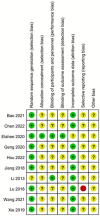Efficacy of Moxibustion for Cancer-Related Fatigue in Patients with Breast Cancer: A Systematic Review and Meta-Analysis
- PMID: 38372234
- PMCID: PMC10878217
- DOI: 10.1177/15347354241233226
Efficacy of Moxibustion for Cancer-Related Fatigue in Patients with Breast Cancer: A Systematic Review and Meta-Analysis
Abstract
Introduction: Breast cancer is the most commonly diagnosed cancer worldwide, and most patients experience fatigue. However, there are no effective treatments for cancer-related fatigue (CRF). Several randomized controlled trials (RCTs) have suggested that moxibustion improves CRF. We conducted a systematic review and meta-analysis to compare the differences in fatigue scale scores, quality of life, and clinical efficacy in patients with breast cancer who developed CRF and did versus did not receive moxibustion.
Methods: RCTs were searched in 7 databases using a standardized search method from database inception to March 2023, and RCTs that met the inclusion criteria were selected.
Results: Among 1337 initially identified RCTs, 10 RCTs involving 744 participants were selected for this study. The meta-analysis involved assessment of the revised Piper Fatigue Scale scores, Cancer Fatigue Scale scores, Karnofsky Performance Scale scores, Athens Insomnia Scale scores, clinical efficacy, and Qi deficiency syndrome scale scores. Compared with the control, moxibustion was associated with significantly better Piper Fatigue Scale scores (P < 0.0001), quality of life [Karnofsky Performance Scale scores (P < 0.0001)], clinical efficacy (P = 0.0007), and Qi deficiency syndrome scale scores (P = 0.02).
Conclusions: Moxibustion improves CRF in patients with breast cancer. The efficacy of moxibustion should be further examined by high-quality studies in various countries with patients subdivided by their breast cancer treatment status.
Registration: PROSPERO ID: CRD42023451292.
Keywords: breast cancer; cancer-related fatigue; fatigue; meta-analysis; moxibustion.
Conflict of interest statement
Declaration of Conflicting InterestsThe author(s) declared no potential conflicts of interest with respect to the research, authorship, and/or publication of this article.
Figures









Similar articles
-
Systemic pharmacological treatments for chronic plaque psoriasis: a network meta-analysis.Cochrane Database Syst Rev. 2021 Apr 19;4(4):CD011535. doi: 10.1002/14651858.CD011535.pub4. Cochrane Database Syst Rev. 2021. Update in: Cochrane Database Syst Rev. 2022 May 23;5:CD011535. doi: 10.1002/14651858.CD011535.pub5. PMID: 33871055 Free PMC article. Updated.
-
Educational interventions for the management of cancer-related fatigue in adults.Cochrane Database Syst Rev. 2016 Nov 24;11(11):CD008144. doi: 10.1002/14651858.CD008144.pub2. Cochrane Database Syst Rev. 2016. PMID: 27883365 Free PMC article.
-
Exercise interventions on health-related quality of life for people with cancer during active treatment.Cochrane Database Syst Rev. 2012 Aug 15;2012(8):CD008465. doi: 10.1002/14651858.CD008465.pub2. Cochrane Database Syst Rev. 2012. PMID: 22895974 Free PMC article.
-
Corticosteroids for the management of cancer-related fatigue in adults with advanced cancer.Cochrane Database Syst Rev. 2023 Jan 23;1(1):CD013782. doi: 10.1002/14651858.CD013782.pub2. Cochrane Database Syst Rev. 2023. PMID: 36688471 Free PMC article.
-
Systemic pharmacological treatments for chronic plaque psoriasis: a network meta-analysis.Cochrane Database Syst Rev. 2017 Dec 22;12(12):CD011535. doi: 10.1002/14651858.CD011535.pub2. Cochrane Database Syst Rev. 2017. Update in: Cochrane Database Syst Rev. 2020 Jan 9;1:CD011535. doi: 10.1002/14651858.CD011535.pub3. PMID: 29271481 Free PMC article. Updated.
Cited by
-
Efficacy of thunder-fire moxibustion for cancer-related fatigue in breast cancer survivors: study protocol for a randomized controlled trial.Front Oncol. 2025 Mar 11;15:1496741. doi: 10.3389/fonc.2025.1496741. eCollection 2025. Front Oncol. 2025. PMID: 40134594 Free PMC article.
-
Moxibustion Treatment, Alongside Conventional Western and Chinese Herbal Medical Therapies, May Improve Survival in Stage-IV Pulmonary Adenocarcinomas in a Dosage-Dependent Manner: A Prospective Observational Study With Propensity Score Analysis.Integr Cancer Ther. 2025 Jan-Dec;24:15347354251342739. doi: 10.1177/15347354251342739. Epub 2025 Jun 19. Integr Cancer Ther. 2025. PMID: 40537919 Free PMC article.
-
Non-pharmacological therapies for quality of life in women with breast cancer: a protocol for a systematic review and network meta-analysis.BMJ Open. 2025 Aug 19;15(8):e097554. doi: 10.1136/bmjopen-2024-097554. BMJ Open. 2025. PMID: 40829827 Free PMC article.
References
-
- Mock V, Atkinson A, Barsevick A, et al.. NCCN practice guidelines for cancer-related fatigue. Oncology. 2000;14:151-161. - PubMed
-
- Grandgirard J, Poinsot D, Krespi L, Nénon J, Cortesero A. Cancer-related fatigue: inevitable, unimportant and untreatable? Results of a multi-centre patient survey. Entomol Exp Appl. 2002;103:239-248. doi:10.1023/A - DOI
Publication types
MeSH terms
LinkOut - more resources
Full Text Sources
Medical
Miscellaneous

